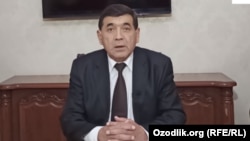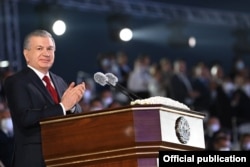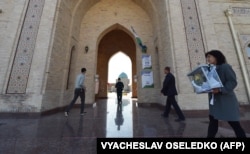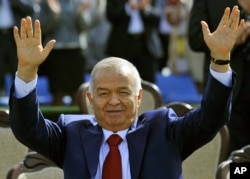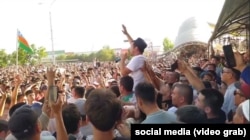There is little doubt who will win the day in the presidential election in Uzbekistan on July 9.
For the better part of a decade, President Shavkat Mirziyoev has set the tone in Central Asia’s most populous country, ushering in some reforms and optimism for change before settling into what many analysts say is a more familiar and repressive groove.
One man who never stood a chance of taking part in the election is Xidirnazar Allaqulov, a former university rector turned regime opponent who says he has seen his attempts to establish a political party repeatedly and sometimes violently thwarted by authorities.
But as Mirziyoev eyes a fresh presidential term -- elongated from five to seven years thanks to a recent constitutional overhaul -- it is Allaqulov and his supporters' encounters with the state that perhaps best illustrate the limitations of the strongman's much-hailed political thaw.
“For 32 years of independence there has been no competition in our political arena,” the 67-year-old Allaqulov told RFE/RL in a phone interview days before the vote and shortly after the Justice Ministry had rejected his party's bid to register for a second time.
“They don’t want it. They don’t want justice. They don’t want the rule of law,” Allaqulov complained emotionally.
'The Dirtiest Methods Available'
There have been no such utterances from Mirziyoev’s three direct rivals for the presidency since campaigning began on May 10 -- and none is expected.
Of the trio, one is a former education minister, another a former high-ranking forestry official, and the third a career judge fresh from service in the slavishly loyal Uzbek Senate.
On July 2, state television broadcast the second of two presidential election “debates” that neither Mirziyoev nor his fellow candidates took part in.
Unsurprisingly, the discussions between appointed representatives of the four candidates were low-energy and controversy-free.
Like those three noncritical challengers, Allaqulov is a former state employee, although in his case, a future jail sentence currently looks more likely than a future government job.
Last month, as he was gathering signatures to register his Truth, Progress, And Unity party in the city of Ferghana, he and his supporters were set upon by people they had never seen before.
After the confrontation spilled over into the police station, Allaqulov claims that he, his son, and his grandson were accosted by a gang of men in plainclothes.
"They forced us onto the marble floor. They twisted our legs, beat our pressure points, prevented us from breathing, and twisted and manhandled our genitals," Allaqulov said.
Despite apparently sustaining injuries during the alleged attacks -- Allaqulov sent RFE/RL multiple photos that he said showed bruises on his body, as well as stitches on his son’s stomach -- it is Allaqulov who is now under investigation for allegedly injuring police officers, according to a Ferghana police press release.
“They use the dirtiest methods available to prevent the work of our party,” he said, while denying any wrongdoing. “This time they openly used violence. In May, we were set on by a group of women in Andijon. They were dressed as cleaners, but they were actually police officers who had changed into regular clothes.”
The June 7 incident in Ferghana represents the worst intimidation that Allaqulov has experienced since February 2021, when he attempted to hold a congress for his unregistered party shortly after declaring a desire to compete in the presidential election scheduled for later that year. (In Uzbekistan, a candidate must be nominated by a registered party or association in order to stand in a vote.)
On that occasion, his Tashkent home was surrounded by a squad of security troops and Allaqulov was taken to Andijon, some five hours’ drive away, where police said a private citizen had filed a complaint against him.
As with the most recent incident, Allaqulov alleges that members of his family were subjected to physical abuse by officers during the raid.
“In the area immediately surrounding my house, they have installed around 15 video cameras,” Allaqulov said. “They film me from the left and from the right. It is the same situation for many other activists.”
From Belief To 'Deep Depression'
Political pluralism is one of a number of self-evident red lines that have remained as holdovers from the hard-line reign of Islam Karimov, under whom Mirziyoev served as prime minister for 13 years until Karimov’s death in 2016.
Only one new political party has emerged since the dictator’s death, with the Ecological Party of Uzbekistan (OEP) winning registration in 2019.
And the OEP -- which nominated former forester Abdushuqur Hamzaev for the upcoming vote -- can hardly be considered an independent force.
According to Allaqulov, signatories to his party registration campaign have been systematically harassed by authorities.
In 2021 -- the first time the party was denied registration -- the Justice Ministry recognized the validity of only half of the necessary 20,000 signatures, a threshold that rights defenders have long called unrealistic.
In its latest rejection, the ministry approved only 1,439 of the signatures that the party submitted among its documents.
Mirziyoev has made the idea of a New Uzbekistan central to his political campaigns, including ahead of a constitutional referendum that gave him the right to "reset" his term count and run for two more consecutive terms.
He won plaudits for nearly eradicating forced labor in the cotton fields, opening the country to tourism and investment, and allowing limited media freedoms.
But reversals became notable even during his first term in office, while a lethal crackdown on minority unrest in the nominally autonomous republic of Karakalpakstan in July last year critically undermined the strongman’s national slogan.
Last week, Gazeta.uz -- one of the private media outlets to blossom during the post-Karimov thaw -- deleted without explanation an article that it had published to coincide with the anniversary of those events.
The deleted article had called the bloodshed “a tragedy that could have been avoided,” noting that a state commission had yet to produce its long overdue report on the crisis. It also threw doubt on the official death toll of 21 people, which several reports have suggested was far higher.
In a May column for the Carnegie Endowment for International Peace, political analyst Rafael Sattorov called the violence triggered by subsequently scrapped proposals to downgrade the republic's constitutional status "the biggest political crisis of [Mirziyoev’s] rule" to date.
Mirziyoev now faces a "reformer's conundrum" and is recognizing that the demand for change that he helped nurture is "impeding his campaign to consolidate power," the analyst concluded.
Allaqulov acknowledges that Uzbeks “hoped and believed” at the start of the post-Karimov period but maintains that they have fallen into a “deep depression” in "a lawless dictatorship."
And he has good reason for pessimism regarding the country’s top leader.
It was Mirziyoev, then as prime minister, who signed off on his 2004 dismissal as rector of the state university in the city of Termez, close to the Afghan border.
A PR campaign against him followed, as well as a criminal case in which he won an unlikely acquittal before taking the issue of his dismissal all the way to the UN Human Rights Committee in Geneva.
In 2017, a year into Mirziyoev’s rule, the committee ruled in his favor, yet Allaqulov was not reinstated to his position.
“For many people, the role of rector is one of the most lucrative in our system, because so many corruption schemes go through this office. When I was rector, I blocked them all,” Allaqulov said, referring to requests by the Uzbek security services and the state prosecutor, who subsequently chased him through the courts.
“What did I learn from this? I learned that it is impossible to fight injustice on your own,” explaining his decision to form a party. "There are lots of people in this country -- especially young people -- who want to live under the rule of law."
Marius Fossum, the Norwegian Helsinki Committee’s regional representative in Central Asia, predicts that Allaqulov’s political career will probably remain perilous as long as the clear July 9 race favorite remains beyond criticism.
“By declaring his political plans, [Allaqulov] was openly challenging the president, and thus we see the reaction,” Fossum told RFE/RL. “Don’t touch the president and his family. That is still the most important red line in today’s Uzbekistan.”


